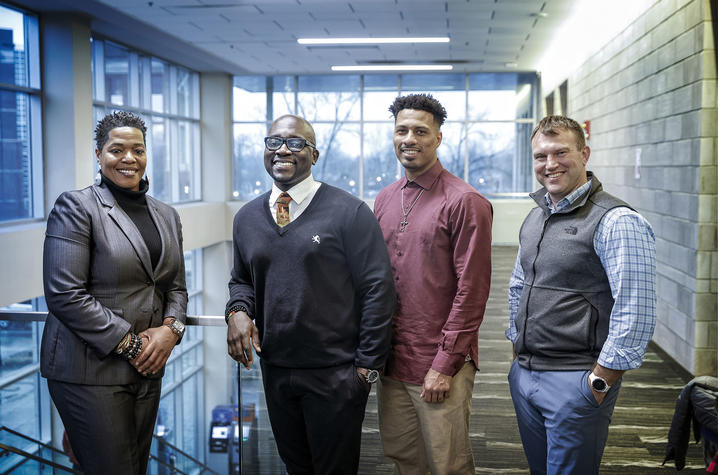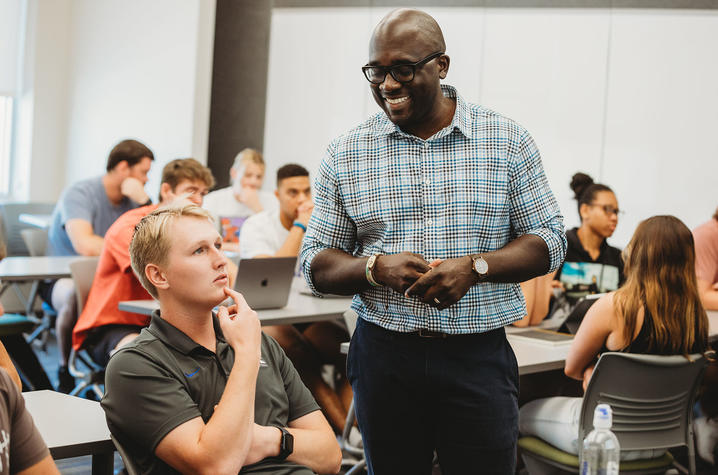Education’s Future of Sport Institute grows capacity for change across global sport industry
LEXINGTON, Ky. (Feb. 29, 2024) — The new Future of Sport Institute at the University of Kentucky College of Education is helping drive conversations around contemporary issues facing the global sport industry.
The institute is directed by Kwame Agyemang, Ph.D., the George and Betty Blanda Endowed Professor in Sport Leadership in the Department of Kinesiology and Health Promotion. The department recently launched its first bachelor’s degree in sport leadership, which will be enhanced by the institute’s focus on the future of the sport industry.
Agyemang is passionate about the future of sport and recent years have provided no shortage of topics to address.
“Think about Gen Z fandom, or lack thereof,” he said. “A lot of sport entities are having to wrestle with how they are going to engage with Artificial Intelligence. Saudi Arabia has thrown a curveball with the amount of money they are paying some players to come, positioning Saudi Arabia as a hub for sports and entertainment. There are increasing calls to tackle social justice. We have seen growing investor interest in women’s sports. Then you have the rights of college athletes to profit from their name, image, and likeness and the list goes on.”
Agyemang says today’s sport organizations are not optimized to deal with many of these shifts and disruptions. As new issues come into play, the institute will engage with like-minded changemakers and innovators on how to lead and manage through change.
“I think sport is a microcosm of society, and so many people are passionate about sport. Despite that, while there is a lot of literature out there about the future of work in other industries, I am not seeing a lot about sports,” he said.
As director of the Future of Sport Institute, Agyemang is focused on filling that gap.
The institute will conduct and disseminate rigorous, high-impact research that can enhance the existing literature and provide sport leaders with useful tools to enhance their ability to create the future of sport.
Agyemang, whose work focuses on large-scale change in complex and uncertain environments, saw an increased need for this body of research in 2020, with the call from society for companies to tackle racism and social justice. The North American Society for Sport Management recently named him the 2024 winner of the Joy Desensi Diversity Award for Inclusive Excellence.
“After the NBA and WNBA came back from Covid, they had social justice messages on their court, on their jerseys,” Agyemang said. “Companies, including sport organizations, made calls condemning racism, and stated they were going to stand and be committed to the Black community. Then Black employees were sharing their own experiences working within those organizations. You would hear people say, ‘this organization said Black Lives Matter, but this has been my experience working in that company.’”
Leaders in sport began reaching out to Agyemang, asking for help in leading change.
“I am now writing a book that really tries to help leaders create a better workplace for Black and brown employees,” he said.
Leading with purpose, knowing that a sports team is more than just a sports team, is important, said Agyemang, who is editor-in-chief of Sport Business and Management: An International Journal.
“There’s this adage ‘more than an athlete’ that Lebron James and a number of athletes have made popular. I think the same holds true for sport organizations, realizing it’s bigger than them. They are more than just profit. They are looking at the impact they can have on society at large.”
Agyemang envisions the institute becoming a hub for sports stakeholders to have a space to talk and learn from each other. He welcomes experts across disciplines at the University of Kentucky and around the world to partner and collaborate with the institute. In doing so, Agyemang hopes the institute can ultimately accelerate the sport industry’s capacity to thrive amidst changes and disruptions.
Despite his focuses on navigating challenges, Agyemang is hopeful about the future.
“Our lives are constantly changing, so we should not be afraid of change. I tell my students all the time to embrace change and think about it like a strength training workout. It hurts sometimes, but you do it because you want to build endurance and stamina,” he said.
Agyemang says the same advice holds true, whether for a student, a sport organization, or a business professional.
“I think we will come out better in the future as a result of the things we are having to encounter now,” he said.
As the state’s flagship, land-grant institution, the University of Kentucky exists to advance the Commonwealth. We do that by preparing the next generation of leaders — placing students at the heart of everything we do — and transforming the lives of Kentuckians through education, research and creative work, service and health care. We pride ourselves on being a catalyst for breakthroughs and a force for healing, a place where ingenuity unfolds. It's all made possible by our people — visionaries, disruptors and pioneers — who make up 200 academic programs, a $476.5 million research and development enterprise and a world-class medical center, all on one campus.






